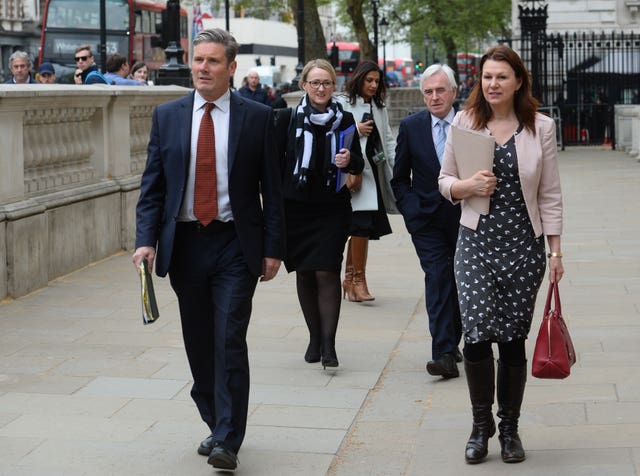Queen’s Speech could be delayed by Brexit impasse
Cross-party talks on an EU withdrawal deal continued in Whitehall.

The Government looks set to delay the next Queen’s Speech as the impasse over Brexit continues.
With cross-party talks on the EU Withdrawal Agreement showing little sign of progress, Theresa May’s spokesman indicated that the parliamentary session could be extended until the Commons has ratified a Brexit deal.
This would mean the parliamentary set-piece outlining the Government’s legislative agenda being postponed from the expected date in June to as late as the autumn.
Meanwhile, Government hopes of avoiding elections to the European Parliament on May 23 appear to have evaporated, with the bill to ratify a Brexit deal no longer expected to be put before Parliament this week.

Mrs May’s effective deputy David Lidington and Chancellor Philip Hammond led the Government side in talks in Whitehall with a Labour team including shadow Brexit secretary Sir Keir Starmer and shadow chancellor John McDonnell.
Mr Lidington said Monday’s talks were “positive” and “productive”, the BBC reported.
Smaller working groups are likely to meet later in the week.
The EU’s chief Brexit negotiator Michel Barnier said he hoped to see results this week from talks between the Labour Party and the Government.
Delivering a speech to a university in Belgium, Mr Barnier said: “We need to fix Brexit quickly. The ball is in the UK court – the ball is in London. It has been six months since the deal was agreed between the EU and the UK.
“The EU agreed to give the UK more time because the UK has requested to, and so talks are still ongoing in London – that is where the deadlock must be broken. We are hoping to see the results of the cross-party talks this week.”
Pressure was mounting on Jeremy Corbyn to commit the party to a confirmatory referendum on whatever deal emerges from the talks.
Labour’s ruling National Executive Committee is to gather on Tuesday for a crunch meeting to finalise the party’s position on Brexit for next month’s European elections.
Ahead of the meeting, Labour MPs Peter Kyle and Phil Wilson wrote to Mr Corbyn and all NEC members urging them to ensure that a confirmatory ballot is in the manifesto.

Mr Wilson told the Press Association that a referendum was backed by the majority of Labour MPs, MEPs, members and supporters and had featured in the policy approved by conference last autumn.
Labour MPs had twice been whipped in the Commons to support a motion tabled by the pair to require any Brexit deal to be subject to a public vote, he said.
“Three years on, we know more about what Brexit means and people should be allowed to compare what the deal is with what they were promised and decide whether they want to go ahead,” said Mr Wilson.
“If we don’t do it, the coming years will be divisive because people will be turning round and saying ‘Hang on, I didn’t vote for this’.”
Some 115 MPs and MEPs signed a letter to NEC members organised by the Love Socialism, Hate Brexit group urging them to explicitly back a referendum in the manifesto.
Deputy Labour leader Tom Watson used his Twitter account to urge followers to lobby NEC members to back a public vote.
And 22 Labour candidates in the European elections have pledged to campaign for a referendum and then back efforts to remain in the EU.
Meanwhile, some of Labour’s biggest union backers are also throwing their weight behind a referendum pledge.
TSSA general secretary Manuel Cortes said: “Frankly it’s time for our party to act on the overwhelming wishes of its members and voters by pledging to support a confirmatory public vote on any Brexit deal.
“We will be pushing hard for this to be included in Labour’s European manifesto.”
But Labour MP Stephen Kinnock warned a referendum promise could backfire, telling BBC Radio 4’s Today programme: “I think it would be divisive, not decisive. You could well end up with a narrow victory for Remain. I think this would lead very rapidly to campaigning for ‘best out of three’.”
Senior Tories have have been hoping the Euro-elections can be avoided if a compromise deal can get through Parliament before polling day, allowing the contest to be cancelled.
With Nigel Farage’s Brexit Party riding high in the polls, Tories fear the May 23 ballot could result in a mauling for Mrs May if she has not been able to deliver the Brexit that Britons voted for almost three years ago.
But parliamentary time is running perilously short for the passage of the Withdrawal Agreement Bill through both Houses of Parliament, as well as a successful “meaningful vote” on the deal.
Mrs May’s spokesman indicated that the PM wants to complete ratification before bringing the parliamentary session to an end.
“What we are focused on is the Withdrawal Agreement Bill, because that is the legislation which is necessary in order to ratify our withdrawal from the EU,” he said.
“That is part of the current Queen’s Speech cycle and we need to finish that work.”
The Queen’s Speech is normally an annual event, but a two-year session was announced in June 2017 in order to allow time for complex Brexit legislation to pass through Parliament.





